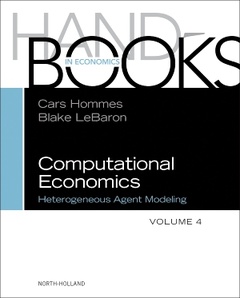Computational Economics: Heterogeneous Agent Modeling Heterogeneous Agent Models Handbooks in Economics Series

Handbook of Computational Economics: Heterogeneous Agent Modeling, Volume Four, focuses on heterogeneous agent models, emphasizing recent advances in macroeconomics (including DSGE), finance, empirical validation and experiments, networks and related applications. Capturing the advances made since the publication of Volume Two (Tesfatsion & Judd, 2006), it provides high-level literature with sections devoted to Macroeconomics, Finance, Empirical Validation and Experiments, Networks, and other applications, including Innovation Diffusion in Heterogeneous Populations, Market Design and Electricity Markets, and a final section on Perspectives on Heterogeneity.
Introduction: Why heterogeneity? Cars Hommes and Blake LeBaron
Macroeconomics 1. Bounded Rationality and Heterogeneous Agents in Macroeconomics: Microfoundations William Branch and Bruce McGough 2. Agent-based Macroeconomics (including policy & innovation) Herbert Dawid and Domenico Delli Gatti 3. Firm Dynamics Robert Axtell 4. Heterogeneous agents in the Macroeconomy: Reduced-heterogeneity representations Xavier Ragot
Finance 5. Heterogeneous Agent Models in Finance Xue-Zhong (Tony) He and Roberto Dieci 6. Leverage Cycles Doyne Farmer 7. Market Microstructure Jean-Philippe Bouchaud
Empirical validation and experiments 8. Empirical Validation of Heterogeneous Agent Models Thomas Lux and Remco Zwinkels 9. Experimental Macroeconomics Jasmina Arifovic and John Duffy 10. Experimental Games Rosemarie Nagel and Felix Mauersberger
Networks 11. Complex Financial Networks Giulia Iori and Rosario N. Mantegna 12. Economic and Social Networks Sanjeev Goyal
Other Applications 13. Market Design and Electricity Markets Leigh Tesfatsion
Perspectives on heterogeneity 14. Modeling a Heterogeneous World Alan Kirman and Rick Bookstaber
Graduate students and professors worldwide studying quantitative economic methods and their applications.
Blake LeBaron has a Ph.D. in Economics from the University of Chicago. He is the Abram L. and Thelma Sachar Chair of International Economics at the International Business School, Brandeis University. He is a Research Associate at the National Bureau of Economic Research, and was a Sloan Fellow. LeBaron also served as director of the Economics Program at The Santa Fe Institute in 1993. LeBaron's research has concentrated on the issue of nonlinear behavior of financial and macroeconomic time series. He has been influential both in the statistical detection of nonlinearities and in describing their qualitative behavior in many series. LeBaron's current interests are in understanding the quantitative dynamics of interacting systems of adaptive agents and how these systems replicate observed real world phenomenon. Also, LeBaron is interested in understanding some of the observed behavioral characteristics of traders in financial markets. This behavior includes strategies such as technical analysis and portfolio optimization, along with policy questions such as foreign exchange intervention. In general, he seeks to find out the empirical implications of learning and adaptation as applied
- Helps readers fully understand the dynamic properties of realistically rendered economic systems
- Emphasizes detailed specifications of structural conditions, institutional arrangements and behavioral dispositions
- Provides broad assessments that can lead researchers to recognize new synergies and opportunities
Date de parution : 06-2018
Ouvrage de 834 p.
19x23.3 cm



